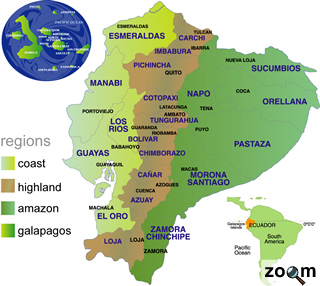These communities are having some real problems maintaining their livelihoods in the face of the bulldozers and oil drilling machines working their way through the rainforest. It is becoming clear that Ecuador is finding it difficult to strike a balance between accelerating its economic growth and maintaining progress in social and human development.
Physical Map of Ecuador. Three distinct regions run North to South: The Coast, The Sierra, The Amazon/Orient.
Spillages of crude oil are common in the Orient. In recent years there have been some twenty incidents each year, mostly attributed to technical faults and human negligence on the part of PetroEcuador. June this year saw one of the worst incidents of recent times where a leak of heavy metal liquid contaminated the underground aquifer. What was, until recently, a rich supply of geologically filtered water to the communities, could now require decades to return to a safe level of toxicity.
Newscutting from El Comercio, Quito and Ecuador national paper.
Rafael Correa , the first indigenous president of Ecuador, was recently voted in for a second four-year term. Despite the right wing propaganda in private mainstream media, he remains popular with both the city middle classes, and the remote poorer communities, who await his promises of social reforms.
It seems justified that his government is making the most of their natural resources in order to fuel economic development. This is essential to fulfill the social reforms that were promised. The problem as I see it, as is often the case in developing nations with natural resources, is the lack of supervision and control over the activities of self interested private firms such as PetroEcuador.
PetroEcuador Flag over La Mariscal, Quito
A large part of my work here involves the design and installation of small scale community water systems in Intag. Not only does potable water provision form a crucial part of the development of rural communities, it is also a basic human right, and a fundamental part of the UN Millennium Development Goals.
It is disappointing and frustrating that despite the work we are undertaking to further the quality of life of communities in Intag, in a neighbouring province just over 100 km away things are going in completely the other direction.
There seems little justification that this sustainable lifestyle, formed by the Amazonians over centuries, is the sacrifice that is being paid for the barrels of oil that may allow the government to fulfill its electoral promises.



No comments:
Post a Comment